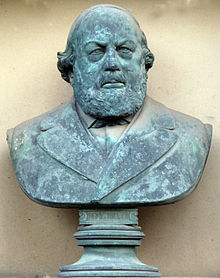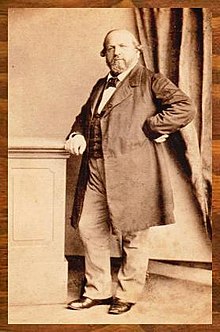Ferdinand von Hiller
Ferdinand Hiller , from 1875 by Hiller , (born October 24, 1811 in Frankfurt am Main ; † May 11, 1885 in Cologne ) was a German composer , conductor and music teacher . In 1875 he was raised to the personal, non-inheritable nobility by being awarded the Order of the Württemberg Crown .
origin
His parents were Justus Hiller (until 1814 Isaac Hildesheimer, 1760-1833) and his wife Regine Sichel (1786-1839), the daughter of the businessman Joseph Salomon Sichel († 1798) and his wife Keile Jessel . His father was a merchant and partner in the Sichel und Hildesheimer manufactory goods store (December 1814 Sichel & Hiller). The partner of the company was his uncle Salomon (Sylvestro) Sichel († 1822).
Life
His first teacher was Aloys Schmitt , and when he was ten years old his wealthy father sent him to Johann Nepomuk Hummel in Weimar because of his compositions and his talent . There he devoted himself to composition; His works include the Entreactes to Maria Stuart , through which he made Goethe's acquaintance. Hiller made great strides as a pianist under Hummel. In March / April 1827, Hummel and his wife Elisabeth Röckel took the 15-year-old on a memorable trip to Vienna , where they visited the dying Ludwig van Beethoven .
After a short stay at home, Hiller went to Paris in October 1828 , where he stayed until 1836 (and premiered Beethoven's 5th Piano Concerto there). Hummel's recommendation gave him access to the salons of leading musicians and poets. Ferdinand Hiller met Luigi Cherubini , Gioachino Rossini , Giacomo Meyerbeer , Hector Berlioz and Franz Liszt as well as Heinrich Heine , Ludwig Börne , Honoré de Balzac and Victor Hugo . He was able to develop a particularly close relationship with Frédéric Chopin , who dedicated his Nocturnes Op. 15 to him. During his time in Paris, Hiller gave annually celebrated concerts as a pianist (Beethoven, Bach) and conductor. He also worked for some time as an organ teacher at the Chorons Music Institute .
The death of his father made his return to Frankfurt necessary for some time, but on January 8, 1839, he performed his opera La Romilda in Milan , which, despite Rossini's recommendation, failed at La Scala in Milan . He began writing his oratorio The Destruction of Jerusalem , which is considered one of his finest works. At the invitation of his friend Mendelssohn , he successfully premiered his oratorio on April 2, 1840 in Leipzig . In the same year Hiller married the Polish singer Antolka Hogé (1820-1896). Back in Italy in 1840/41 to study church music, Baini and Santini conveyed the works of Palestrina to him. Hiller became the center of the German artists' colony in Rome.
Mendelssohn persuaded his friend to take on the direction of the Gewandhaus concerts in Leipzig for him because of his obligation in Berlin . However, Hiller was only in Leipzig for six months in the winter of 1843/44, where there was a lasting rift with Mendelssohn. In 1844 Hiller moved to Dresden . Here Hiller performed two more operas, Der Traum and Konradin , in 1845 and 1847 respectively. He established the subscription concerts and took over the management of the Liedertafel. Contacts with Wagner, friendship with Robert and Clara Schumann. Hiller was also in contact with the banker Carl von Kaskel , who is connected to music and apparently supported him in financing his concert series. In 1845 Hiller founded a debating club for witty people, called the "Hiller Crown". They met every Monday in “Engels Restauration und Billard” at Postplatz . The group was only given the name “Monday Society” after Hiller's departure from Dresden.
As a conductor he came to Düsseldorf in 1847 and to Cologne in 1850 and directed the Opéra Italien in Paris in 1851 and 1852. In Cologne he became an authority as director of the Gürzenich Orchestra and the Conservatory of the City of Cologne . From 1853 he was the festival director of the Niederrheinische Musikfest a total of twelve times . Among his friends in Düsseldorf was Karl Ferdinand Sohn , who died in 1867 while visiting him in Cologne. He retired in 1884 and died at the age of 73. His grave is in the Melaten cemetery in Cologne (HWG between Lit. M and T, no. 437) .
Hiller was a member of the Masonic lodge Zur Aufstieg Morgenröthe in Frankfurt am Main.
family
He married the Polish singer Antolka Hogée in Livorno in 1841 (* January 12, 1820, † April 26, 1896). The couple had several children including:
- Paul (1853–1934), opera baritone, theater director, music critic, essayist and translator
- Tony (1850–1931), actress ∞ James Kwast (1852–1927), Dutch-German pianist and music teacher
Honors

- Bavarian Maximilian Order for Science and Art (1862)
- In 1875 he was raised to the personal, non-hereditary nobility by being awarded the order of the Württemberg crown ( ennoblement ).
- In the Cologne district of Lindenthal , Ferdinand von Hiller's work was honored by naming a street.
Works (selection)
Stage works
- La Romilda ( Gaetano Rossi ), Opera seria (first performed on January 8, 1839 in Milan)
- The Dream of Christmas Eve ( Carl Gollmick ), 3 acts (first performed on April 9, 1845 in Dresden)
- Konradin ( Robert Reinick ) (first performed on October 13, 1847 in Dresden)
- Der Advokat ( Roderich Benedix ), comic opera, 2 acts (first performed on December 21, 1854 in Cologne)
- Die Katakomben ( Moritz Hartmann ), serious opera, 3 acts (first performed on February 15, 1862 in Wiesbaden)
- The Deserter ( Ernst Pasqué ), serious opera, 3 acts (premiered on February 17, 1865 in Cologne)
Works for piano and orchestra
- Piano Concerto No. 1, F minor op.5
- Piano Concerto No. 2, F sharp minor, op.69
- Piano Concerto No. 3, A flat major, Concerto espressivo, op.170
Other works
- Four symphonies, including Symphony in E minor, Op. 67 ( It must be spring )
- The Destruction of Jerusalem (Oratory)
- ABC book for children of all ages / drawn by artists from Dresden. With stories and songs by R. Reinick and songs by Ferdinand Hiller. Wigand, Leipzig 1845 Digitized edition of the University and State Library Düsseldorf
- In: Düsseldorfer Lieder-Album: 6 songs with piano accompaniment. - Düsseldorf: Arnz, 1851. Digitized edition of the University and State Library Düsseldorf
Publications
- Chats with Rossini , Kölnische Zeitung , 1855 (as a book edition in Aus dem Tonleben der Zeit , Vol. 2, pp. 1–84; new edition edited by Guido Johannes Joerg, Stuttgart 1993)
- From the clay life of our time , 3 volumes, 1868–1871
- Letters to an unnamed. Cologne 1877
- Artist life , 1880
- Memorial sheets , 1884
student
- Caspar Joseph Brambach (1833–1902)
- Max Bruch (1838-1920)
- Julius Buths (1851-1920)
- Hugo Grüters (1851-1928)
- Friedrich Gernsheim (1839-1916)
- Gisbert Enzian (1847-1919)
- Engelbert Humperdinck (1854–1921)
- Carl Venth (1860-1938)
literature
- Arthur F. Bussenius: Carl Wilhelm Taubert, Ferdinand Hiller ( The Composers of Modern Times , No. 43). Publishing house Balde, Kassel 1857.
- Robert Eitner : Hiller, Ferdinand von . In: Allgemeine Deutsche Biographie (ADB). Volume 50, Duncker & Humblot, Leipzig 1905, pp. 339-341.
- Carl Reinecke : And some dear shadows rise - memorial sheets to famous musicians . Published by G. Reinecke, 1900, Google Books
- Rudolf Bockholdt: Hiller, Ferdinand von. In: New German Biography (NDB). Volume 9, Duncker & Humblot, Berlin 1972, ISBN 3-428-00190-7 , p. 152 f. ( Digitized version ).
- Michael Gehlmann: Proportio aftificiosa raro usitata. Time-metrical extensions as an original moment in Ferdinand Hiller's compositional work (= Studies and Materials for Musicology, Vol. 103). Publishing house Georg Olms, Hildesheim 2018, ISBN 978-3-487-15712-2 . (Contains a comprehensive Hiller catalog raisonné.)
- H. Ehrlich: Obituary Ferdinand von Hiller . In: Die Gartenlaube (1885), p. 367 f.
In the contributions to the Rhenish musical history of the International Association for the Rhine music history published Reinhold Sietz various writings and materials to Ferdinand Hiller:
- editor
- From Ferdinand Hiller's correspondence [vol. I] (1826-1861). Cologne: Arno Volk 1958.
- From Ferdinand Hiller's correspondence. Vol. II (1862-1869). Cologne: Arno Volk 1961.
- From Ferdinand Hiller's correspondence. Vol. III (1870-1875). Cologne: Arno Volk 1964.
- From Ferdinand Hiller's correspondence. Vol. IV (1876-1881). Cologne: Arno Volk 1965.
- From Ferdinand Hiller's correspondence. Vol. V (1882-1885). Cologne: Arno Volk 1966.
- From Ferdinand Hiller's correspondence. Vol. VI (Auerbach, Levi, Pasqué, Stockhausen, Gade). Cologne: Arno Volk 1968.
- From Ferdinand Hiller's correspondence. Vol. VII (Gernsheim, publisher; various; register). Cologne: Arno Volk 1970.
- author
- Anton Schindler and Ferdinand Hiller in their personal relationships. With two unprinted letters from Schindler ; in: Studies on the music history of the Rhineland. Festschrift for the 80th birthday of Ludwig Schiedermair, ed. by Willi Kahl, Heinrich Lemacher and Joseph Schmidt-Görg. Cologne: Arno Volk 1956.
- Ferdinand Hiller and Moritz Hartmann ; in: Ursula Eckart-Bäcker: Studies on the music history of the Rhineland (III). Festschrift for Heinrich Hüschen's 50th birthday. Cologne: Arno Volk 1965.
Web links
- Literature by and about Ferdinand von Hiller in the catalog of the German National Library
- Works by and about Ferdinand von Hiller in the German Digital Library
- Biography with pictures and sound samples ( Memento from November 18, 2011 in the Internet Archive )
- Sheet music and audio files by Ferdinand von Hiller in the International Music Score Library Project
- Catalog raisonné by Ferdinand Hiller in the International Music Score Library Project
- Catalog raisonné by Ferdinand Hiller on Klassika
- Digitized archive holdings on Ferdinand Hiller in the digital historical archive in Cologne
- Ferdinand Hiller's résumé , on ub.uni-frankfurt.de; accessed May 25, 2015
- Ferdinand Hiller's estate , at ub.uni-frankfurt.de, accessed on May 25, 2015
- Monday Society: Ferdinand Hiller founded it in 1845 on dresden.stadtwiki.de; accessed July 23, 2015
- Song portal
Individual evidence
- ↑ Alexander Dietz, Stammbuch der Frankfurter Juden , 1907, p. 153.
- ^ Georg Heuberger (ed.): Moritz Daniel Oppenheim . Frankfurt am Main 1999, p. 157.
- ↑ NDB .
- ^ MGG , Munich 1989, vol. 6, col. 401.
- ^ Konrad Adenauer, Volker Gröbe: Streets and squares in Lindenthal . JP Bachem, Cologne 1992, ISBN 3-7616-1018-1 , pp. 73 f.
- ^ Sietz studied musicology and was a librarian at the University Library in Cologne
| personal data | |
|---|---|
| SURNAME | Hiller, Ferdinand von |
| ALTERNATIVE NAMES | Hiller, Ferdinand (maiden name before ennoblement) |
| BRIEF DESCRIPTION | German composer |
| DATE OF BIRTH | October 24, 1811 |
| PLACE OF BIRTH | Frankfurt am Main |
| DATE OF DEATH | May 11, 1885 |
| Place of death | Cologne |


